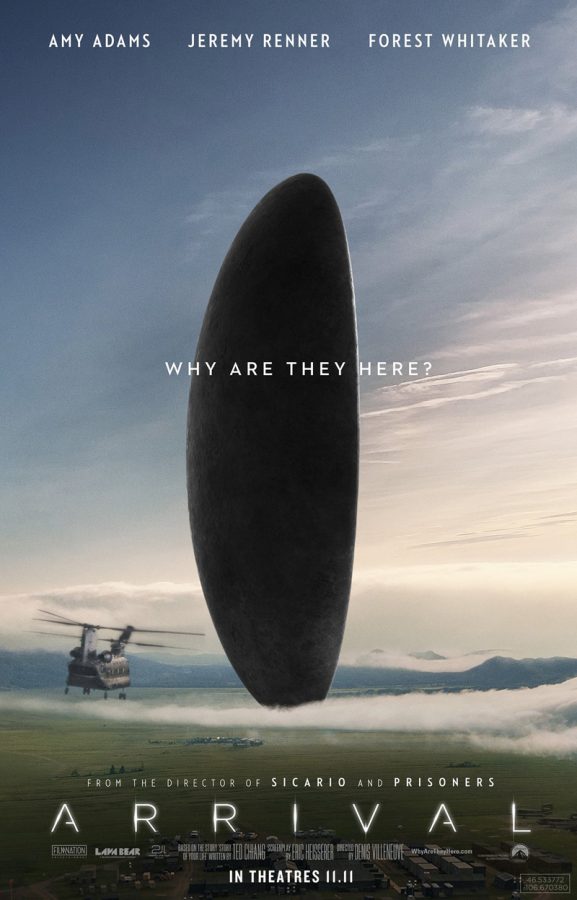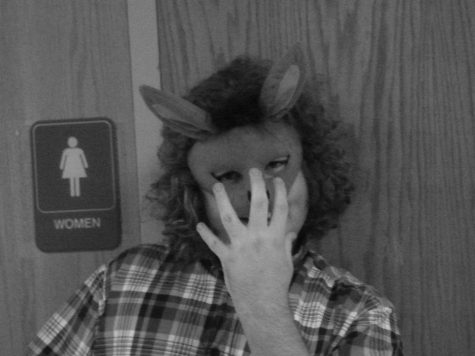Arrival Review
December 16, 2016
Coming hot off the heels off of Sicario, a tense tale of cartels and a raid south of the border and Enemy, a strange, surreal, and nightmarish film that eludes one single genre, director Denis Villeneuve further shows his mastery of any type of film he tries his hand at with Arrival, which is the best science fiction movie of the last five years. Before reading this review, know that if you’re okay watching a movie with gorgeous camerawork, a constant feeling of discovery, and without bombastic set pieces, you should watch this movie right now. Don’t read anything about it, don’t watch a trailer, just go and see it blind.
If you’re still on the fence, here are some more details- the film is truly beautiful to watch. Almost any given frame could be framed and sold. The landscapes both show the beauty of Earth and the sheer scale of the alien ships, and the cramped and busy interiors show the efforts of the world trying to talk to them without telling the audience and bogging the film down. Amy Adams delivers a great performance, and the things the story shows of her character demonstrate her range and ability to sell very specific emotions. Jeremy Renner does an admirable amount with what little he is given, using his limited time not talking about the plot to sell his character extremely well.
Although the story is something so well-executed that telling it would be a waste, it’s still worth telling that this is one of the few movies to make my jaw actually drop. The “twist” isn’t withheld from the audience, and if you can connect the dots together you can realize it from multiple points in the movie- the person I saw it with came to the discovery it at a different time than I, because the expert way that the scenes that deal with it allow for multiple interpretations let us see them differently.
The sound and music is also incredibly well-executed, with the whale song-esque sounds of the aliens making anyone’s heart race, along with the score that effortlessly sells the spirit of humanity and how alien the extraterrestrials are. Even the requisite sad violin song wasn’t as overstated as other movies would have it be in the scenes where it’s used.
The next two paragraphs contain spoilers. Please, please, please see this movie if you’re remotely interested from what you’ve already read. The restraint Villeneuve uses and the discoveries made are the heart of this film and reading the next two paragraphs hurts it a lot.
The Heptapod design itself is very well-done, being a far cry from the usual fare in sci-fi movies of being humans with CGI sprouting off of them- these are a mixture of the familiar and the strange, being a sort of cloaked being atop a seven-fingered hand that moves like a squid. The closest comparison I can make is that of the art of Polish painter Zdzisaw Beksiski, whose paintings were based off of his vivid nightmares that he thought were visions of Hell. Despite that, they manage to be interesting- you might feel a knot in your stomach nearby them, but their sheer strangeness makes you want to see how they work.
Unfortunately, the film struggles in its eleventh hour, where its central concept, twist, and climax are all located. Their decision to tell audiences the power of language by making the protagonist able to mentally travel through time because she learned how to speak Heptapod not only doesn’t make sense, but its use in defusing the political subplot feels less like her learning and mastering her newfound ability under pressure and more like Bill and Ted escaping from the San Dimas jail. I’m fine with her abilities in and of themselves, especially with Amy Adam’s acting chops pulling off every beat perfectly, but the explanation for why and how they’re used feels insulting. Additionally, the short story that the film is based on provides another twist to her actions- similar to the protagonist of Slaughterhouse-Five, Louise cannot change her fate, only act out the motions. This is a matter of preference, but it personally adds another heartbreaking layer to the way her marriage turns out instead of the movie’s strong implication that she can change what happens in the future (“I had to make a choice, and he disagreed with me.”)
In spite of its stumbling in the last twenty minutes, Arrival is still a breath of fresh air. Its lush visuals, fantastic acting and design, and slow burn of a story are a sharp relief to the other films currently available for viewing in town. This movie’s quality has restored my hopes for Blade Runner 2, also directed by Villeneuve, and I hope that he continues to make movies on this level of quality for the foreseeable future.




























